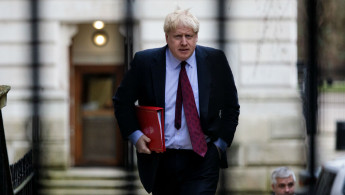Britain urges Iran to stop arming Yemen's Houthi rebels
Britain on Monday urged Iran to stop sending weapons into Yemen and instead use its influence to end the conflict, as the Saudi-led coalition's military intervention enters its fouth year.
Saudi Arabia has been leading an aerial bombing campaign in support of the government and against the Iranian-backed Houthi rebels.
The United Nations has found Tehran in violation of an arms embargo on Yemen by failing to block supplies of missiles and drones to the Huthis.
In a joint statement, Britain's Foreign Secretary Boris Johnson and International Development Secretary Penny Mordaunt urged Iran to change course.
"If Iran is genuinely committed to supporting a political solution in Yemen - as it has publicly stated - then it should stop sending in weapons which prolong the conflict, fuel regional tensions, and pose threats to international peace and security," they said in the statement.
"We question why Iran is spending significant revenue in a country with which it has no real historical ties or interests, rather than using its influence to end the conflict for the good of the Yemeni people."
The Houthis expelled pro-government forces from the capital Sanaa in September 2014 and went on to seize swathes of the impoverished Arabian Peninsula country.
This prompted the Saudi-led coalition to intervene militarily on March 26, 2015.
Since then, around 10,000 people have been killed and 53,000 wounded in Yemen.
The war has created what the UN describes as the world's worst humanitarian crisis.
While Iran has backed Shia Houthi rebels, Britain has continued to supply arms to Saudi Arabia, drawing strong and sustained criticism from rights groups due to alleged war crimes committed by the Saudi-led military coalition.
In a recent statement, Amnesty International said that US and UK arms sales to the Saudi-led coalition in Yemen made a "mockery" of global arms treaties and has resulted in "enormous harm" to civilians, agencies reported.
"But this has not deterred the USA, the UK and other states, including France, Spain and Italy, from continuing transfers of billions of dollars' worth of such arms," said Lynn Maalouf, Amnesty's Middle East research director.
Despite this, Britain has repeatedly voiced its support for Saudi Arabia, with Johnson saying earlier this month that Riyadh has "a right to defend its national security."





 Follow the Middle East's top stories in English at The New Arab on Google News
Follow the Middle East's top stories in English at The New Arab on Google News
![The UAE is widely suspected of arming the RSF militia [Getty]](/sites/default/files/styles/image_330x185/public/2024-11/GettyImages-472529908.jpg?h=69f2b9d0&itok=Yauw3YTG)
![Netanyahu furiously denounced the ICC [Getty]](/sites/default/files/styles/image_330x185/public/2024-11/GettyImages-2169352575.jpg?h=199d8c1f&itok=-vRiruf5)
![Both Hamas and the Palestinian Authority welcomed the ICC arrest warrants [Getty]](/sites/default/files/styles/image_330x185/public/2024-11/GettyImages-2178351173.jpg?h=199d8c1f&itok=TV858iVg)